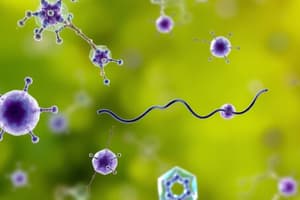Podcast
Questions and Answers
What is the primary focus of biochemistry?
What is the primary focus of biochemistry?
- Studying the behavior of animals in their natural habitats
- Investigating the biodiversity of ecosystems
- Exploring the molecular foundation of living organisms (correct)
- Analyzing the geological composition of rocks
Which biomolecules are typically studied in biochemistry?
Which biomolecules are typically studied in biochemistry?
- Rocks, minerals, water, and air
- Fungi, algae, bacteria, and viruses
- Proteins, lipids, nucleic acids, and carbohydrates (correct)
- Insects, reptiles, mammals, and amphibians
What do metabolic pathways in biochemistry primarily involve?
What do metabolic pathways in biochemistry primarily involve?
- Converting nutrients into energy (correct)
- Providing structural support to cells
- Maintaining cell membrane integrity
- Storing genetic information
Which function do biomolecules like proteins perform within cells?
Which function do biomolecules like proteins perform within cells?
What role do regulatory mechanisms play in biochemistry research?
What role do regulatory mechanisms play in biochemistry research?
Why are signaling pathways important in biochemistry?
Why are signaling pathways important in biochemistry?
What technique is commonly used by biochemists to separate biomolecules based on their physical properties?
What technique is commonly used by biochemists to separate biomolecules based on their physical properties?
Which method provides information about the structure and function of biomolecules by measuring their interaction with light?
Which method provides information about the structure and function of biomolecules by measuring their interaction with light?
What do biochemists measure using enzyme assays?
What do biochemists measure using enzyme assays?
Which field has significantly benefited from biochemists' understanding of the molecular basis of diseases?
Which field has significantly benefited from biochemists' understanding of the molecular basis of diseases?
What presents unique challenges to researchers in biochemistry due to its complexity?
What presents unique challenges to researchers in biochemistry due to its complexity?
Which field benefits from the investigation of the environmental impact of pollutants on biochemical processes?
Which field benefits from the investigation of the environmental impact of pollutants on biochemical processes?
Flashcards are hidden until you start studying
Study Notes
Biochemistry within the Scope of Biology
Biochemistry, a field that combines chemistry and biology, delves into the molecular foundation of living organisms. It explores the complex chemical processes that sustain life at the molecular level, from the structure and function of biomolecules to the biochemical pathways that regulate growth, reproduction, and maintenance.
Molecular Machinery of Life
Biochemistry investigates the structure and function of biomolecules, such as proteins, lipids, nucleic acids, and carbohydrates. These molecules perform essential tasks within cells, including catalyzing chemical reactions, maintaining cell membrane integrity, storing and transmitting genetic information, and providing structural support.
Metabolic Pathways and Energy Transformation
Biochemistry also examines the intricate network of metabolic pathways that convert nutrients into energy and maintain cellular homeostasis. These pathways involve the step-by-step transformation of biochemical compounds, and they are central to understanding how organisms convert food into energy and sustain life.
Regulatory Mechanisms and Signaling Pathways
Regulatory mechanisms and signaling pathways are also integral to biochemistry research. These mechanisms control and coordinate cellular processes, ensuring that cells respond appropriately to their environment and maintain a healthy state. Examples include gene expression, protein synthesis, and cell signaling pathways that govern cell growth, differentiation, and death.
Techniques and Methods
To study these biological processes, biochemists employ a range of techniques and methods, including:
- Gel electrophoresis, which separates biomolecules by size or charge.
- Spectroscopy, which measures the interaction of light with biomolecules to provide information about their structure and function.
- Enzyme assays, which measure the activity of enzymes, the biological catalysts that drive metabolic reactions.
- Chromatography, which separates biomolecules based on their physical properties.
Impact of Biochemistry
Biochemistry has significant implications for various fields of study, including medicine, agriculture, and environmental science. For instance, biochemists have played a pivotal role in understanding the molecular basis of diseases, developing therapeutic drugs, and investigating the environmental impact of pollutants on biochemical processes.
Challenges and Opportunities
Biochemistry is a rapidly evolving field, and the complexity of biomolecular systems presents unique challenges to researchers. For example, understanding the interactions between proteins, nucleic acids, and lipids requires advanced computational methods and powerful experimental techniques. However, these challenges also create exciting opportunities for discovery and innovation.
Conclusion
Biochemistry is a fundamental and vibrant field of study that investigates the molecular foundations of life. By exploring the structure and function of biomolecules and the intricate metabolic pathways that regulate cellular processes, biochemists make valuable contributions to various fields of science, including medicine, agriculture, and environmental science. The complexity of biomolecular systems presents unique challenges to researchers, but these challenges also create exciting opportunities for discovery and innovation in biochemistry and related fields.
Studying That Suits You
Use AI to generate personalized quizzes and flashcards to suit your learning preferences.




